Category: HVAC
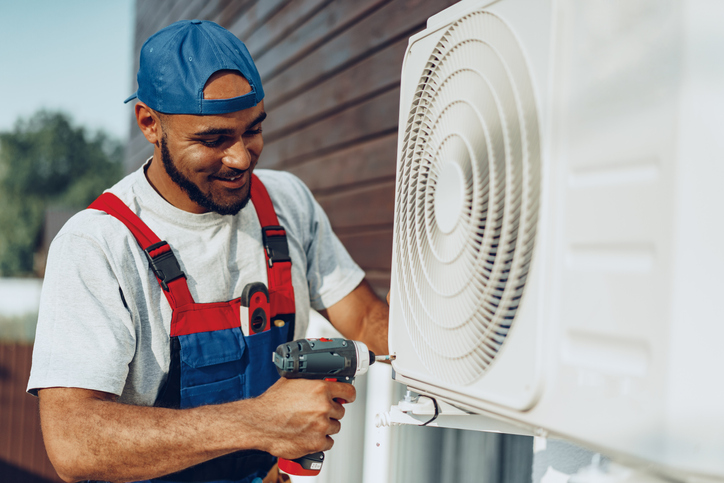
HVAC (Heating, Ventilation and Air Conditioning) systems are great for making life more comfortable. But when they’re not installed properly, they can be dangerous–causing fires, explosions or emitting toxic fumes. If you’re considering a career as an HVAC technician, you’ll be responsible for installing, repairing and maintaining these systems. In order to do so safely, you’ll need to be well versed in industry regulations and practices. When working with systems that utilize natural gas, propane, butane, hydrogen, methane, and mixed gasses, you’ll be adhering to a variety of gas codes or guides that dictate how to safely install and repair these systems based on the type of gas you’re working with.
At North American Trade Schools (NATS), you’ll become familiar with relevant gas codes–in addition to building other practical skills and knowledge for a career as an HVAC technician. Below, learn more about what gas codes are and why your knowledge of them will be important after completing your HVAC training at the North American Trade Schools.
What are Gas Codes?
Gas codes are used by technicians and inspectors to guide the safe installation of appliances and piping. As an HVAC technician, you’ll need to ensure that you’re familiar with the codes in the municipality where you’re working before installing, repairing or inspecting a fuel system. There are several key codes to follow when it comes to working with fuel systems. For one, you’ll learn about the International Fuel Gas Codebook (IFGC), a widely used guide agreed upon by engineers but not to be confused with manufacturer codes. Manufacturer codes supersede the IFGC when the two conflict, as all products from manufacturers, are tested by regulatory agencies before approval.
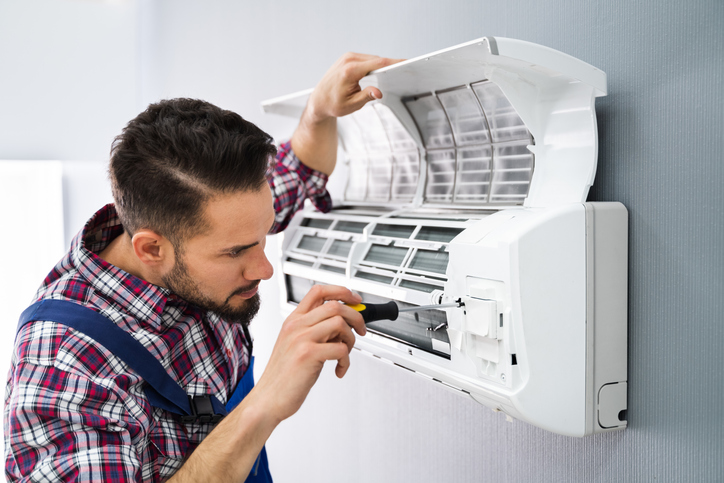
What’s in the International Fuel Gas Codebook?
The International Fuel Gas Codebook contains eight chapters of important safety information. In your HVAC technician courses, you’ll receive guidance on how to interpret and apply the information in the IFGC to your work on site. The first chapter deals with administration; defining what is covered under each code and the provisions put in place for departments of inspection. The second chapter covers important definitions. Chapter three outlines general safety regulations such as hazardous locations for appliances, combustion, dilution air, and ventilation requirements. The following chapters outline best practices for gas piping installations, chimneys and vents, specific appliances, gaseous hydrogen systems and more. Equipped with the knowledge of the IFGC after your training, you’ll be prepared to safely and knowledgeably perform work on any HVAC system.

When Can You Expect to Use Gas Codes as an HVAC Technician?
When you begin your career in HVAC, you’ll use the IFGC and other regional and manufacturer gas codes to guide your approach to installing, maintaining, and repairing gas systems. Throughout your career, you’ll want to consistently refresh your knowledge of gas codes, keeping updated on any regulatory changes.
If you’re seeking a career as an HVAC technician, it’s important to prepare for the workforce with hands-on instruction and gain practical experience using state-of-the-art equipment. At NATS, our HVAC Technician Diploma Program offers a high level of support for students, and you can expect to learn everything you need to know about gas codes and safety regulations from our experienced instructors.
Ready to start HVAC school?
Contact NATS today!
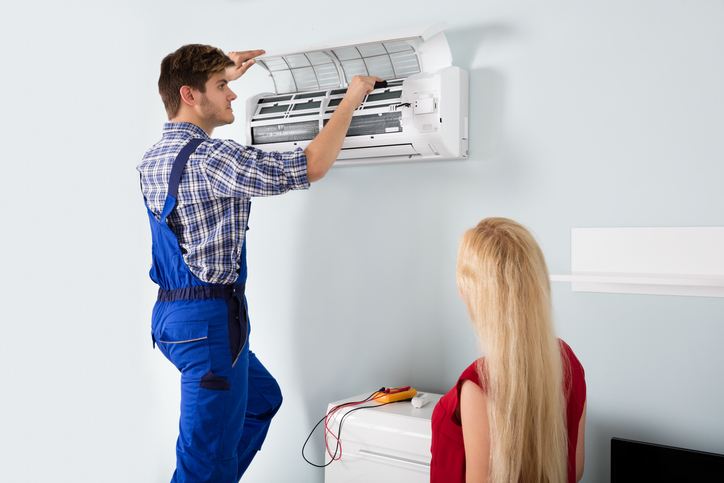
Heating, ventilation and air conditioning is an industry that is gaining popularity. Almost every house today will not only have a central heating system but also a system to control the air quality, humidity and ventilation of a space.
When working in HVAC, it is essential to have good communication skills, especially when engaging with new and existing customers. When it comes to HVAC systems and businesses, clients have many options to choose from. Good communication and customer service are something that all clients care about, so it’s important to offer every customer the best possible experience to secure their business. Read on for some top communications tips when dealing with clients!
1. Answering the Phone Quickly Will Look Professional
Having an open line of communication for your clients to reach you is essential for the steady flow of business. Many customers will call you to get an instant quote on what services you offer, your next availability to service or install an HVAC system, and your prices. In that case, companies need to have someone ready to answer the phone and respond to those queries.
After completing HVAC technician courses, you’ll learn that having reliable customer service is what can truly differentiate your business from others. For example, a client’s A/C may break down in the summer and need to be fixed the next business day. By acting fast when your clients call you about a problem, you can be sure to secure a loyal customer for the future.

2. Make Sure Customers Understand What You Are Saying
Have you ever been somewhere to get a service and the employee keeps using technical terms that you don’t know? This is an example of poor communication skills which can leave the customer feeling lost and confused.
During HVAC school you will receive advanced training in technical procedures relating to gas and propane heating systems and ventilation and air cooling equipment. You will also be taught gas codes & regulations for residential and commercial environments. With this knowledge in the bag, it’ll be your job to break down any problems or procedures to clients in clear and simple terms. That way, you can clarify what services you’ll be performing and leave clients feeling confident in your role as a technician.
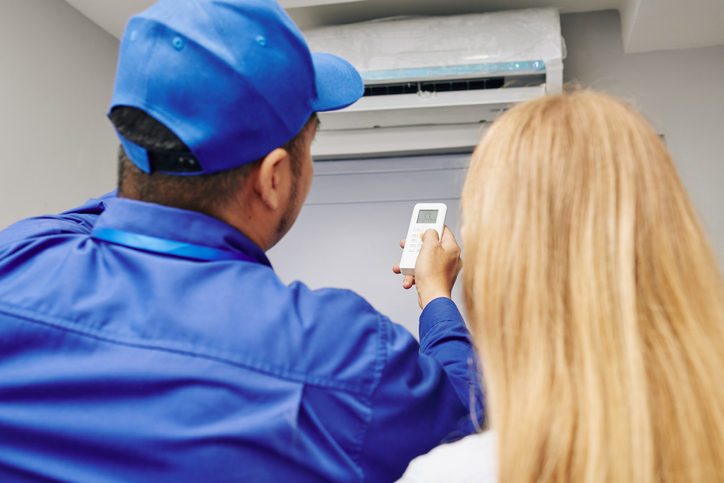
3. Focus on Earning Customer Trust After HVAC School
Loyal customers are the most important attributes of any successful business–and HVAC companies are no different. You may be dealing with clients who are stressed or impatient about getting a service done. In these situations, it’s important to listen to the customer’s concerns and offer them the best solution possible.
In some cases, there may be bigger problems with an HVAC system that will take time to be fixed or replaced. In this case, it is important to be upfront with your clients and give them an honest estimation of your services. When delays or issues arise, inform your clients immediately so they are not left in the lurch. With clear and honest communication, your business can enjoy a loyal and satisfied client base.
Are you looking to earn your HVAC diploma?
Check out NATS today!
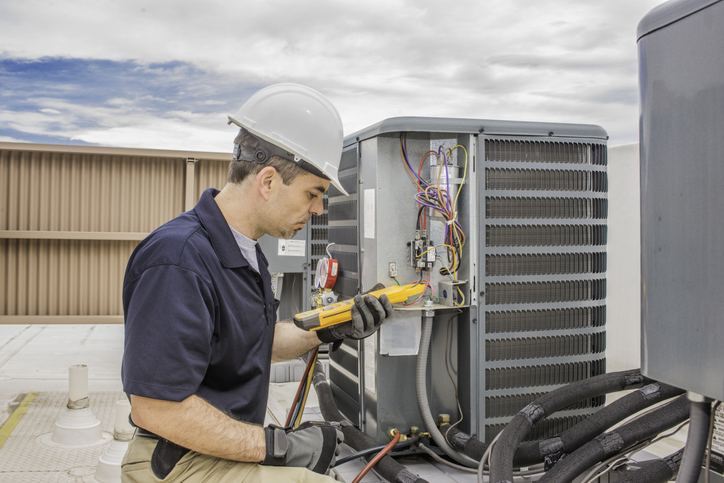
If you’re pursuing an HVAC career, one of your main responsibilities will be to service and repair air conditioning units. Along with other routine maintenance tasks, you’ll need to perform refrigerant pressure checks. Refrigerants are chemical compounds which absorb heat from the surrounding environment. During a refrigerant cycle, refrigerants will repeatedly change from a fluid to a gaseous state depending on their temperature, moving through the cycle’s components in order to reroute heat to other areas. Refrigerants are used mainly in air-conditioning systems, heat pumps, refrigerators, and freezers.
At NATS, you’ll receive hands-on training to pursue an HVAC technician apprenticeship, learning how to install and maintain gas and propane heating systems, air conditioning units, and ventilation equipment for both commercial and residential environments. Below, get a head start on your training by discovering a few key things to note about checking refrigerant pressure.
Checking Refrigerant Pressure Requires an Understanding of the Refrigerant Cycle
As an HVAC technician, understanding the ins and outs of refrigerant pressure won’t be possible without basic knowledge of refrigerant cycles. Refrigerant cycles consist of four basic components: the compressor, condenser, expansion device, and evaporator. The compressor is what uses the most power in an HVAC system–responsible for compressing gaseous refrigerant in a cooler state to a high-pressure, high temperature vapour. From here, the refrigerant is cooled by the compressor, a coil filled with hot refrigerant which wraps around the system to diffuse heat. Next, the expansion device works to reduce the refrigerant pressure quickly to prepare it for evaporation. Evaporation will occur in the evaporator, which boils the refrigerant. Through these exchanges in energy and changes in matter, refrigerant regulates the temperature of a system.
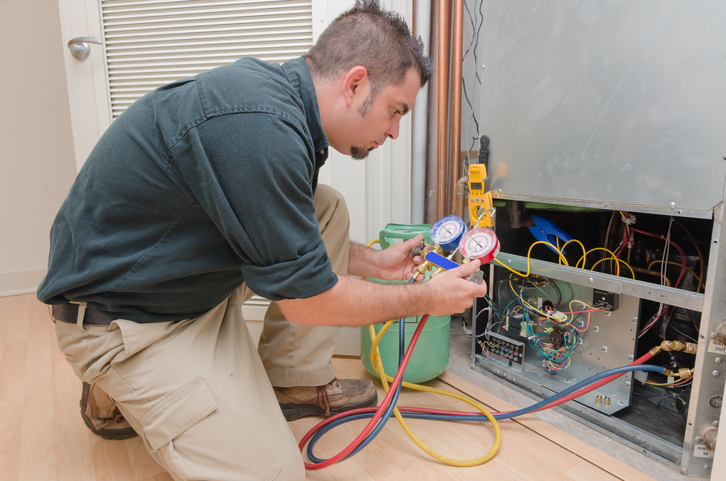
What Condensing Pressure of a Refrigerant Means for an HVAC Technician
When refrigerant changes from a gas to a liquid within a cycle, this creates what’s known as condensing pressure; a form of condensation. This occurs when refrigerant moves through the condenser, releasing heat as its temperature drops to the temperature of condensation. The condenser is a cooling system composed of tubes which expand over a large surface area to remove the greatest possible amount of heat. The condensing pressure, which results from the release of heat and sudden drop in temperature, can be read by a pressure gauge. While this gauge can be placed anywhere between the metering device and compressor, it should be placed as close as possible to the condenser in order to obtain an accurate value. During your HVAC technician career, it’s important to remember that a higher-than-normal pressure could indicate problems with the condenser coil, broken or faulty fans, or even leaking refrigerant.
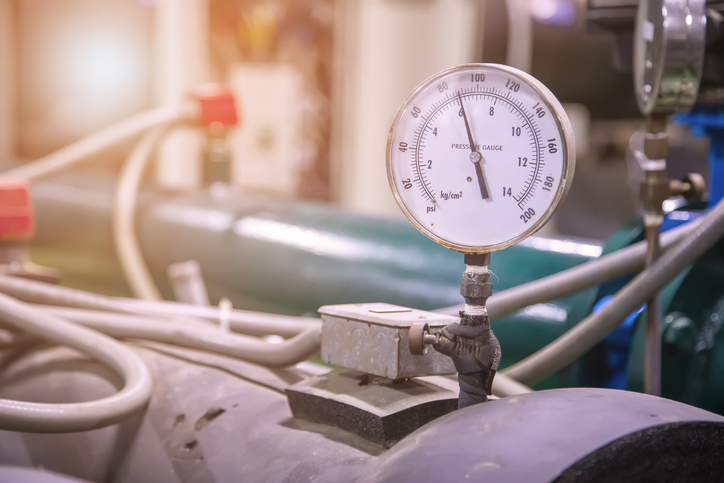
Evaporating Pressure is the Opposite of Condensing Pressure
When you enrol in HVAC technician courses, you’ll also become familiar with refrigerant’s evaporating pressure. A refrigerant’s evaporating pressure is the opposite of condensing pressure. During this phase, the refrigerant chemical compound is vapourized, changing from a liquid to a gaseous state and absorbing heat from its surroundings. When the refrigerant moves through the suction line and evaporator, the valve and line pressure drop. As with condensing pressure, the evaporating pressure can be read using a pressure gauge that’s situated and connected anywhere between the compressor and metering device. A refrigerant’s chemical compound enters the evaporator as a low pressure, cold liquid, but as it absorbs heat, it begins to boil and evaporate.
Are you interested in HVAC school?
Contact NATS for more information about our training programs!
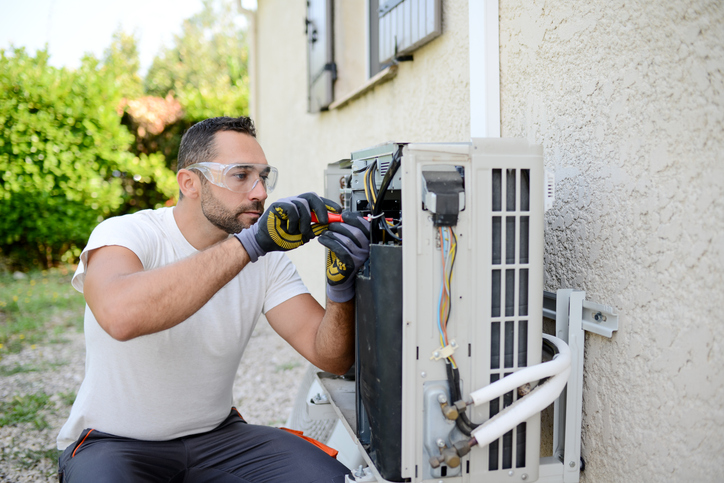
For an aspiring technician looking to work in the HVAC industry, it’s important to know the common issues your customers may encounter that’ll require your expertise in repairing and resolving those issues. HVAC challenges can sometimes have simple solutions when it comes to repairs, but if not handled immediately and properly, they can cause further damages as well as more time and money to fix.
At NATS, you’ll gain hands-on training through our HVAC pre-apprenticeship program. You’ll learn how to install and maintain gas and propane heating systems, as well as ventilation and air cooling equipment for both residential and commercial environments. Your training will prove to be valuable to customers as you work on resolving common HVAC challenges.
Read on to find out the three common challenges you’ll face in your career!
1. As an HVAC Technician, You May Encounter Pilot or Ignition Issues
One of the common HVAC challenges you’ll encounter might have to do with the gas furnace’s pilot or ignition unit. When this issue is present, it prevents the furnace from dispersing any sort of heat around a unit or home, which can be a big problem in extreme cold weather conditions.
Ignition problems for the furnace can be caused by dirty pilots or flame sensors. As a professional HVAC technician, you’ll have to examine these furnace components, as their malfunctioning can cause short-cycling, a pilot outage, delayed ignition of the furnace burners or an entire furnace lockout. You’ll have to assess whether the furnace components have experienced wear and tear over time and need replacement, or whether the issue is related to a gas supply problem.
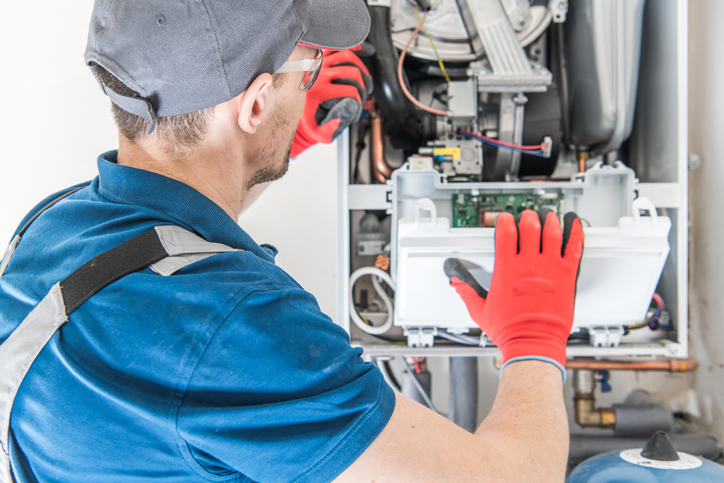
2. Dirty Filters Are Most Common
After you complete your training from an HVAC school, you may get a call from customers regarding poor airflow circulation around their homes or offices. This is most likely related to dirty air filters. Dirty air filters are the most common HVAC challenges you’ll face during your career. However, they’re fairly simple to handle and resolve.
A dirty filter will reduce the lifespan of a customer’s furnace because it places more pressure on the furnace to circulate air. It can also cause it to repeatedly overheat and shut off. You’ll have to replace the dirty filter with a new recommended filter based on its Minimum Efficiency Reporting Value (MERV) rating. The higher the MERV rating of the filter, the better it is for air quality.
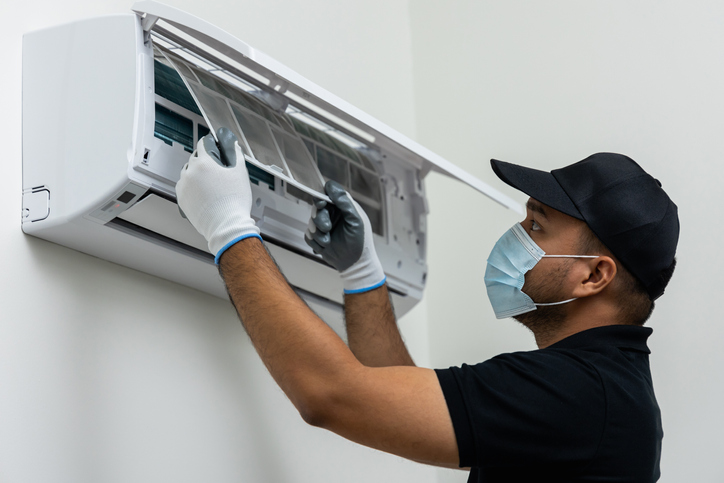
2. Wear and Tear of Heating System Components
Another common HVAC challenge you may come across during your career is complaints about the heating system’s ability to generate heat for an entire office or home. This can be the result of the wear and tear of some components in the heating system. You’ll have to check the heating system for the condition of its bearing and belts. You’ll probably have to check if the belts are stretched or worn out, and if they require replacing. Additionally, the heating system’s motors and bearings might not be well lubricated, and in that case, you’ll have to oil them to allow them to run smoothly.
Are you interested in HVAC technician courses?
Contact NATS for more information about our training programs!

For an aspiring technician in the HVAC industry, the first step to securing a job is acing your job interview. A job interview is your chance to make a positive first impression and demonstrate to a potential employer your professionalism and your suitability for the position.
At NATS, you’ll receive pre-apprenticeship hands-on training in gas and propane heating systems, ventilation and air cooling equipment. The training you receive allows you to launch a successful career upon completion. But to make the most of that training, you’ll also need to know how to impress at a job interview. Read on to familiarize yourself with some of the top interview mistakes to avoid!
Arriving Late to Your HVAC Technician Job Interview
If you arrive late for your interview, it could set a bad first impression that can lower your chances of getting hired. Showing up late could signify to an employer that time management may be an issue. If you have that listed as a skill on your resume, it could hurt your credibility. If you arrive late, your interviewer could assume that you don’t value the HVAC Technician job position or the interviewer’s time. To avoid giving off this impression, make sure that you arrive on time or even better, ten minutes early. In doing so, you can avoid running into unforeseen circumstances that may delay your arrival. At the same time, you will demonstrate your reliability as a worker with excellent time management skills.
Dressing Inappropriately
No matter what position you’re applying for after you complete your HVAC technician courses, you always have to dress appropriately for your interview. If you go to an interview wearing an outfit that is too casual, you’re reducing your chances of making a great first impression. When in doubt, go for a smart-casual look.
Your interviewer might also want you to demonstrate your technical skills in HVAC by getting your hands dirty. In that case, make sure you have an additional outfit with you for the technical part of that interview.

Not Preparing for the Interview
Before you attend an interview, it’s always a good idea to prepare for it ahead of time. While preparing, think of the questions your interviewer might ask you about your work experience, education, hands-on training and the skill set that you will bring to the HVAC position.

Your interviewer will likely assess your communications skills, decision-making process, and problem-solving abilities. With another preparation, you’ll be ready to grab the interviewer’s attention as you provide examples that demonstrate your experience and skills in the field.
Are you interested in HVAC school?
Contact NATS for more information about our training programs!
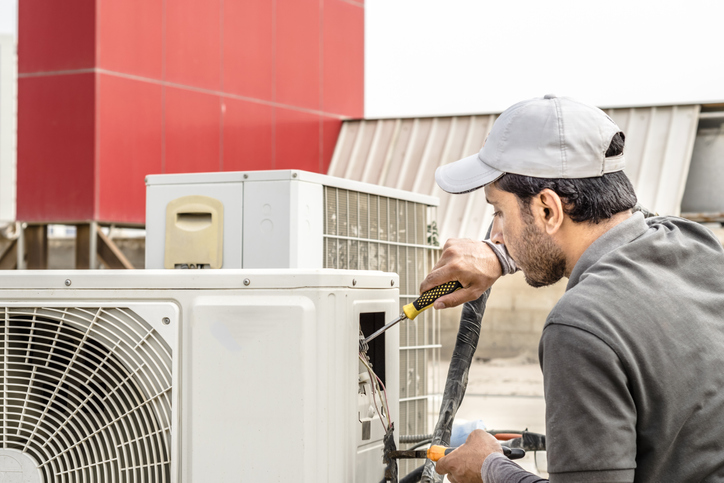
If you enjoy working with your hands and like the idea of servicing heating, ventilation or air conditioning systems, then a career in the HVAC industry is the right choice for you. You’ll apply your hands-on training and practical skills towards a successful and dynamic career. But in order to do so, it’s a good idea to understand what a typical day is like working in the industry.
At NATS, we prepare you for the daily job expectations you will encounter throughout your career. You’ll learn the installation and maintenance of gas and propane heating systems, ventilation and air-cooling equipment for both residential and commercial buildings.
Read on to discover what a day in the life of an HVAC technician is like!
The Work Schedule for an HVAC Technician Depends on the Setting
Whether you enjoy working on a consistent schedule or with on-call shifts, jobs in the HVAC industry offer something for everyone. Your work schedule will depend on your form of employment. When you become an HVAC technician after completing your training from NATS, you’ll get the chance to work for a home building, a commercial business or a construction company. This may give you the opportunity to work regular business hours, on a fixed schedule, or simply when your expertise is needed to troubleshoot issues.
The Start of Your Day Can Vary
After you complete your HVAC technician courses from NATS and start your career in the industry, you’ll realize how dynamic your workday can be. When you work in the HVAC industry, you’ll start your day by going into work and checking the pending tasks that require your attention. You’ll then have to use your organizational skills to manage your schedule and arrange the time to attend to these tasks based on importance.
On the other hand, if you want to become a self-employed contractor, then your day will begin by checking emails or voice messages and answering phone calls from customers requiring your services. No matter how your day starts, you should be prepared to carry your safety gear and tools and start heading over to the locations that require your services.
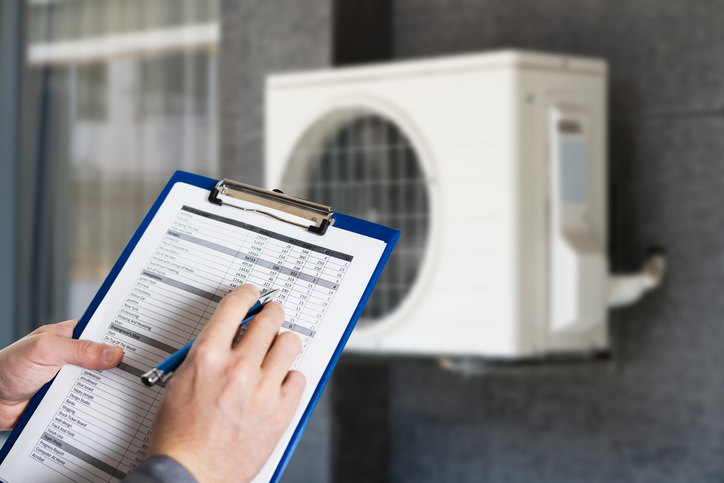
Prepare Yourself for Different Working Conditions
Working in the HVAC industry allows you to experience different working conditions and different settings. With professional training from NATS, you’ll be prepared to handle the different issues that you may face throughout your career. More specifically, you’ll learn how to check airflow, refrigerant pressure, electrical circuits, burners and other components for various clients. You’ll also be prepared to work safely and efficiently in more challenging work conditions, such as extreme temperatures.
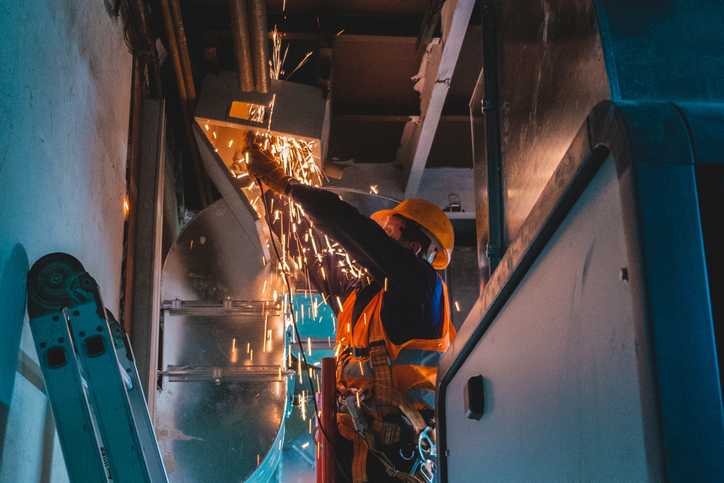
For example, you may have to repair broken furnaces in the middle of winter, when temperatures drop significantly, or repair the air conditioning of a residential or commercial building. Since no one task is the same, you’ll find an exciting and engaging career that puts your skills to the test on a daily basis.
Interested in HVAC school?
Contact NATS for more information!
Considering HVAC School? 4 Advantages to Choosing a Career as an HVAC Technicia
November 02, 2021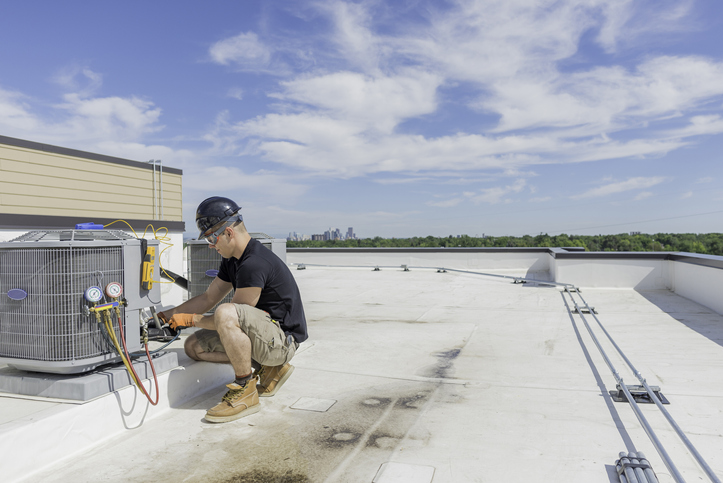
HVAC technicians are experts in HVAC (heating, ventilation, and air conditioning) systems, conducting installations, repairs, routine maintenance, and more. They may work with commercial, residential or industrial air conditioning systems, refrigeration systems–as well as systems of combined heating, ventilation, and cooling. After completing your HVAC training, you’ll be able to perform a range of duties, including the assembly and installation of different system components (vales, gauges, condensers, compressors, evaporators, etc.), and troubleshooting of HVAC systems to identify leaks or other issues. You’ll also perform maintenance tasks such as parts replacement, system calibration, and refrigerant refills.
If you’re considering a career as an HVAC technician, you might just be ready to start your training after learning about the advantages of this career path. Below, discover four of them!
1. HVAC School Graduates are In-Demand in Ontario
If you’re considering HVAC school, there’s never been a better time to enrol. According to JobBank Canada, job opportunities for HVAC technicians in Ontario will be good over the next three years, as retirements create new availability and employment growth creates new opportunities for work. Ontario’s construction industry is growing, and HVAC technicians will be needed to install and maintain the commercial and residential systems for each new structure. Thanks to investments in public facilities and commercial developments, HVAC technicians may also be able to find work supporting industrial projects.
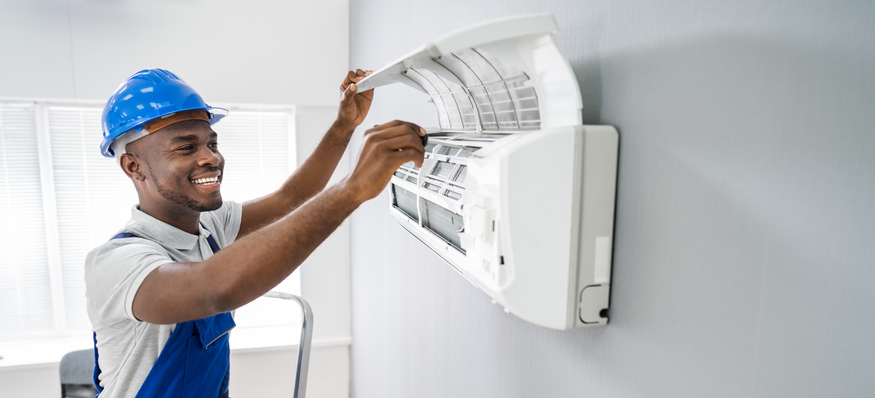
2. HVAC Technicians Benefit from a Dynamic Career
As an HVAC technician, your job will never be boring. HVAC technicians benefit from the ability to perform many different kinds of work throughout their career, depending on their interests and whether they choose to specialize in a particular sector of the HVAC industry. HVAC technicians may work with fireplaces, furnaces, pool heaters, heat pumps, boilers, and refrigeration systems. What’s more, there are many advancements in technology making the work of HVAC technicians increasingly interesting. Smartphone-controlled heating and cooling systems, solar-powered air conditioners, and other innovations are continuing to shape the industry, promising an exciting future for HVAC technicians.
3. Grads of HVAC College Are More Active
Once you become an HVAC technician, you might be surprised by the benefits of the work to your physical health. Graduates of HVAC college have a highly active job, working both indoors and outdoors and travelling between different project locations. Rather than sitting around at a desk all day, you’ll be earning all the health benefits of a job where you’re constantly moving, such as a reduced risk of cancer and reduced risk of heart disease.
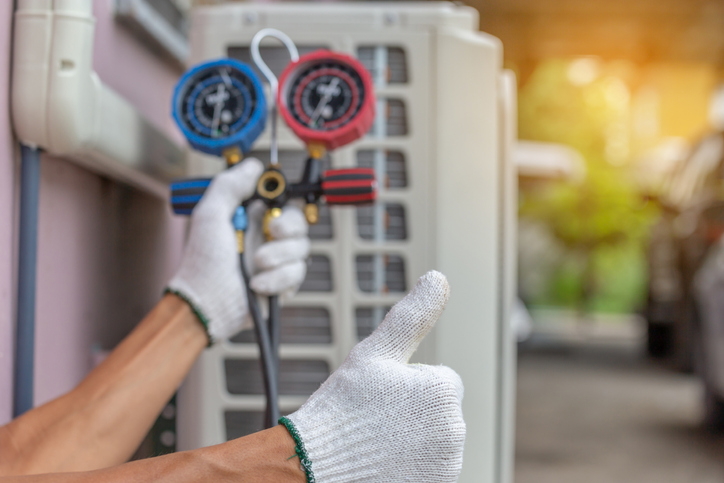
4. As an HVAC Technician, You Have Many Work Opportunities
Once you become an HVAC technician, you don’t need to be restrained by a strict work schedule or an unvaried work environment. In fact, there are many different opportunities for work within the HVAC industry. As a technician in this trade, you may be employed by an HVAC system installation contractor, and you may also find work in different industrial settings, such as: engineering firms, retail, food wholesalers, and other operations. Additionally, after gaining experience in the field, HVAC technicians may choose to open their own business, installing, repairing, and maintaining HVAC systems for various clients and creating their own schedule. If you’re looking to enter a field where you’ll never get bored, becoming an HVAC technician might be right for you.
Ready to enroll in HVAC technician courses?
Launch your career with a program at the North American Trades Schools today!
If You’re Enrolled in HVAC Technician Courses, Discover 5 Signs of Low Refrigerant in a System
October 07, 2021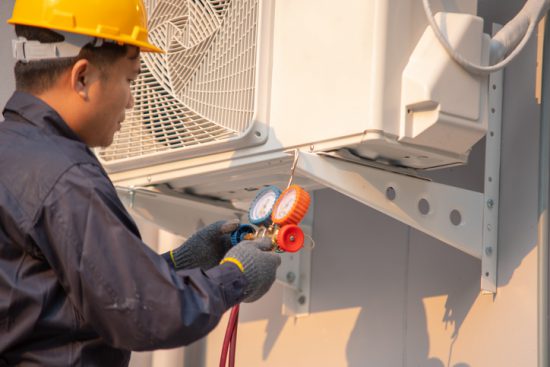
If you’re considering becoming an HVAC technician, you’ll be launching a career as an expert in the field of heating, ventilation, and air conditioning systems. Your expertise will enable you to perform services for clients such as installing HVAC systems, maintaining and repairing the systems, and troubleshooting problems within these systems. When servicing air conditioning systems during your career, one of the most common problems you may encounter is a low level of refrigerant within the system.
Refrigerant, a compound which absorbs heat from the surrounding environment, is essential to the smooth operation of an AC system. Within an AC system, refrigerant is stored inside copper coils–taking in heat from the air in a home or other indoor space. The refrigerant is then distributed through the condenser and compressor, where it is converted from liquid to gas to liquid. The resulting hot air is blown outside, while another fan blows air over the cold coils containing the refrigerant and into the building. Given the importance of refrigerant in the distribution of cold air, when refrigerant levels are low, an AC system’s performance will be negatively affected.
When refrigerant levels are low, it’s typically either due to a leak, or because the AC system was installed incorrectly. During your career as an HVAC technician, becoming familiar with the signs of low refrigerant in an AC system will help you to successfully identify and repair related issues before greater damage ensues. Below, discover five common signs of low refrigerant in an air conditioning system.
1. After HVAC College, Look Out for Longer Cooling Cycles
If a client complains that it’s taking a particularly long time to cool their home, low refrigerant levels could be at fault. With low refrigerant levels, the air being blown indoors is warmer than usual, meaning that the air conditioning system has to run longer cycles to match the thermostat-designated temperature. After HVAC school, check the refrigerant levels of an AC system if the cooling cycles seem unusually long.

2. The Refrigerant Lines Freeze
Low levels of refrigerant can also have a negative effect on the AC system’s refrigerant lines, or evaporator coil. The evaporator coil is responsible for taking hot air from the indoors and adding it to the refrigerant. However, when refrigerant levels are low, the evaporator coil will become too cold, leading to a buildup of ice. Typically, this ice will start to spread to other parts of the AC system, including its surrounding components.
3. The Energy Bills Go Up
When a client complaining of higher energy bills requests your services, the air conditioning system’s refrigerant levels will be one of the first things you’ll want to check. Due to the longer cooling cycles which are needed to cool a home, the air conditioning system is working much harder than it should be. Since harder work translates to a greater consumption of energy, always remember to check refrigerant levels when a client’s energy bill spikes.
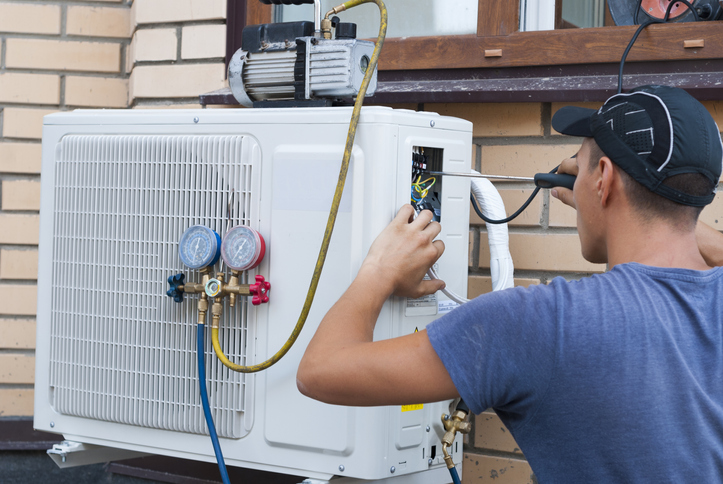
4. Lack of Cold Air
After HVAC college, it’s safe to suspect low refrigerant levels when an AC system isn’t blowing cold air. Because the cooling chamber contains more heat when refrigerant levels are low, it’s difficult for the system to adjust the temperature of the air it’s sending out. This causes the system to expel lukewarm rather than cool air–a problem which is more than inconvenient for those trying to keep their homes cool during the warmer months!
5. There’s a Hissing Noise
When refrigerant levels are low, one of the probable causes is a leak somewhere within the AC system. In the case of a leak, it’s likely that a hissing noise can be heard, indicating that refrigerant has escaped from the coils that contain it. The moment you hear a hissing sound coming from an air conditioner unit, check the refrigerant levels to ensure that there isn’t a hazardous leak.
Ready to enroll in HVAC technician courses?
Become an expert in HVAC systems with a program at the North American Trade Schools!
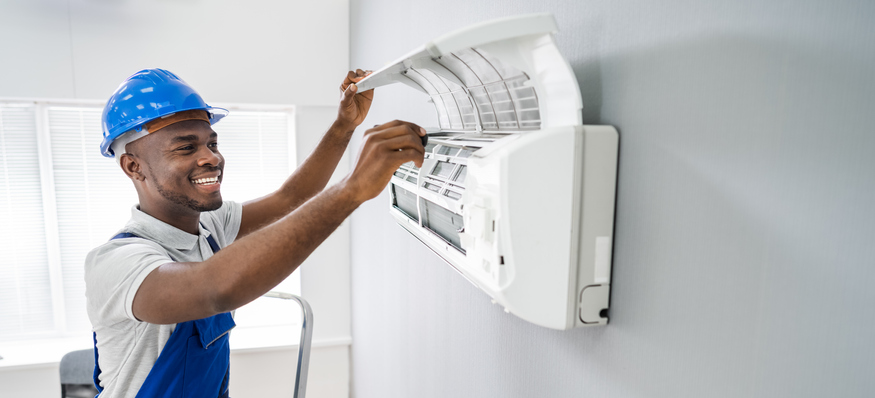
If you’re thinking about becoming an HVAC technician, you’ll be launching a rewarding and dynamic career within the heating, ventilation, and air conditioning industry. With the skills you possess, you’ll be able to provide essential services to clients–installing and maintaining both ventilation and air cooling equipment, as well as gas and propane heating systems. As an HVAC technician, not only will your technical skills be important, but so will your ability to interact with clients and provide quality, reliable service.
Below, explore some qualities that will help you to succeed in the HVAC industry, both during your training and throughout the rest of your career.
1. Graduates of HVAC College Are Good with People
If you have strong interpersonal skills, you’re off to a great start! HVAC technicians interact with many different customers on a daily basis. Therefore, an HVAC technician must be able to speak with a friendly demeanor, listen to any requests or concerns, and provide all necessary information in a patient and comprehensive manner. Once you graduate from HVAC college, your ability to communicate actively with customers will help you to establish trust and earn you even more clients through word of mouth recommendations. During your training, consider building interpersonal skills in order to succeed throughout your HVAC technician career.
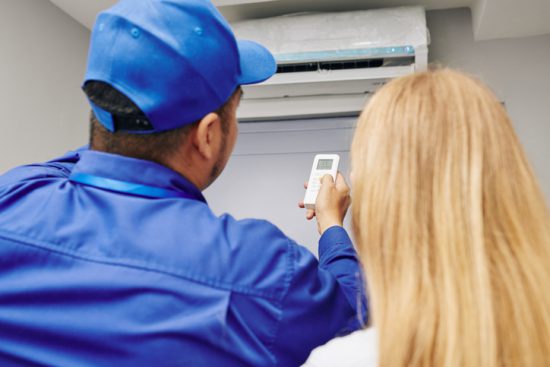
2. Successful Technicians Are Reliable
As an HVAC technician, clients are trusting you to perform a service for them. To gain their trust, you’ll not only want to possess the necessary skills and knowledge, but you’ll also need to provide reliable service. With this in mind, it’s important that HVAC technicians can prove to be extremely reliable, as this will help to enhance their reputation and establish customer loyalty. During your career, make sure to be on time to appointments, and notify customers if you’re running late or are unable to perform a requested installation or repair.
3. Attention to Detail Is a Quality Shared by HVAC Professionals
During HVAC school, you’ll learn about the importance of precision within the HVAC field. HVAC technicians must be able to use a number of tools and testing devices such as thermometers, pressure gauges, voltmeters, manometers, and more. With strong attention to detail, HVAC technicians can use these devices to measure and obtain information about electrical circuits, refrigerant pressure, air flow, and burners. As an HVAC technician, being attentive to detail will help you to accurately install and maintain the heating and ventilation systems you work with–ensuring that no mistakes are made due to incorrect information.
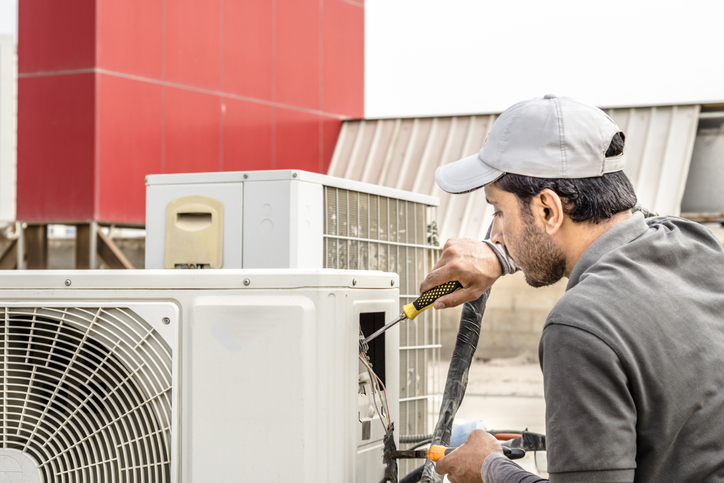
4. Preparedness Is an Essential Quality for HVAC Technicians
If you’re a highly organized person, you’ll excel in a career as an HVAC technician. These professionals must be prepared for a number of different appointments every day–showing up to each one equipped with the tools and equipment necessary to complete the job at hand. As an HVAC technician, preparation is key to being able to perform any installation or repair, as your ability to remember which parts and tools you need for specific tasks will ensure that you’re always providing a quality level of service.
5. A Good HVAC Technician Is Confident
There’s nothing more terrifying to a customer than an HVAC technician who seems unsure of their capabilities. As customers are trusting you to correctly install and repair the heating and ventilation systems they rely on, it’s important that you build the skills necessary to confidently address the needs of your clients. At the North American Trade Schools (NATS), you’ll receive hands-on training in the installation and maintenance of HVAC systems, equipping you with the knowledge to work confidently throughout your career. Consider training with NATS in order to launch a career as a capable and successful HVAC technician!
Ready to take HVAC technician courses?
Launch your career with a program at the North American Trade Schools today!
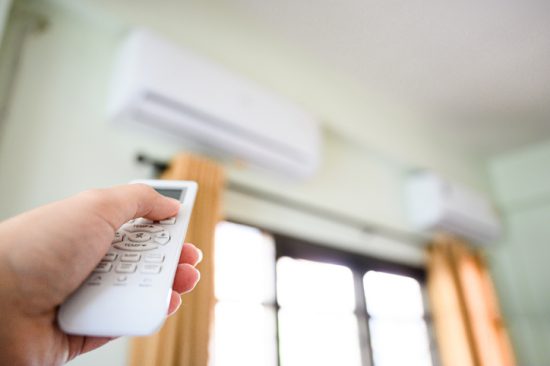
Sustainability is leading the conversation in most industries today. As with the majority of sectors in the construction and maintenance industry, the Heating, Ventilation, and Air Conditioning (HVAC) market is under pressure to go greener. Sustainable HVAC systems are an important innovation for both the industry and our planet. Homeowners and technical workers can benefit from new technologies that reduce the environmental impact of HVAC systems while maintaining their design integrity.
Students training for a career within the HVAC industry will study the installation and maintenance of different HVAC systems in residential and commercial environments. Gas codes and regulations are other important features of HVAC training. To get to grips with the evolving trends of the industry, read on for an overview of the benefits and concepts behind sustainable solutions in HVAC design.
The Benefits of Sustainable HVAC Systems
The drive to reduce energy consumption, greenhouse gases, and the use of fossil fuels are top concerns when it comes to sustainable design initiatives. Delivering hot water and heating to buildings produces a significant greenhouse gas footprint. Sustainable HVAC systems offer a solution to the environmental expense of traditional heating and cooling methods. HVAC systems such as heat pumps work by transferring heat between indoor and outdoor spaces to regulate the temperature of the building. In that sense, they are sustainable alternatives to boilers or furnaces that rely on fossil fuels.
Students in HVAC school might be interested to know that sustainable HVAC systems save both energy and costs in the long run. Up to 30 percent of the energy generated for use in commercial buildings is wasted. On average, HVAC systems last up to 15 years–a long time to endure high energy expenses and greenhouse gas emissions. Both workers and homeowners can benefit from the reduced cost of climate control over the building’s life cycle. It’s important for construction and maintenance technicians to know which sustainable technologies provide the best return over time.

Sustainable HVAC Solutions
There are numerous ways to achieve sustainability in HVAC systems. Thermal air conditioning is a great way to conserve energy without sacrificing power and comfort. Instead of relying on electricity, these units use solar panels to draw energy from their surroundings–an efficient and cost-effective solution.
Duct wrap is another staple of the HVAC industry that is used to reduce energy loss that can occur in air ducts. Unlike regular duct wrap, quiet duct wrap is made from recycled denim reduced from landfills. Quiet duct wraps also prevent irritants or other organic compounds from reducing indoor air quality.
The dual-fuel heat pump is a great solution that uses a combination of fuel types. The dual-fuel heat pump uses both electricity and gas to generate efficient heating and cooling. For homeowners who are concerned about the reliability and power of sustainable systems, the dual-fuel heat pump is one to count on. The pump uses electricity above 1.67 degrees Celsius, but if the temperature drops lower, the pump resorts to gas to heat the home. In that way, sustainable systems provide powerful solutions without compromising energy-efficient efforts.
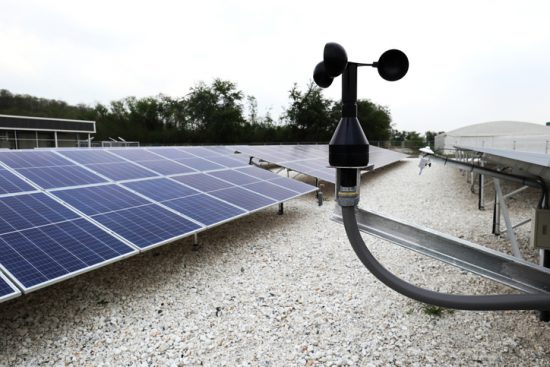
The Future of Sustainability for Those in HVAC College
Students in HVAC technician courses will work with numerous types of equipment to construct and maintain HVAC systems–including: measurement gauges, refrigerant lines, and air ducts. Voltmeters, thermometers, pressure gauges, and other testing devices are used to check airflow, refrigerant pressure, electrical circuits, and other components. Knowing how to apply these tools and materials to sustainable solutions is valuable to stay ahead of the industry. To become more sustainable, construction technicians should consider the bigger picture and think in terms of building integration. By choosing the right products, materials, and building designs, technicians can push for a more sustainable future for the construction industry.
Are you interested in attending HVAC college?
Contact NATS today to learn more about our program!



